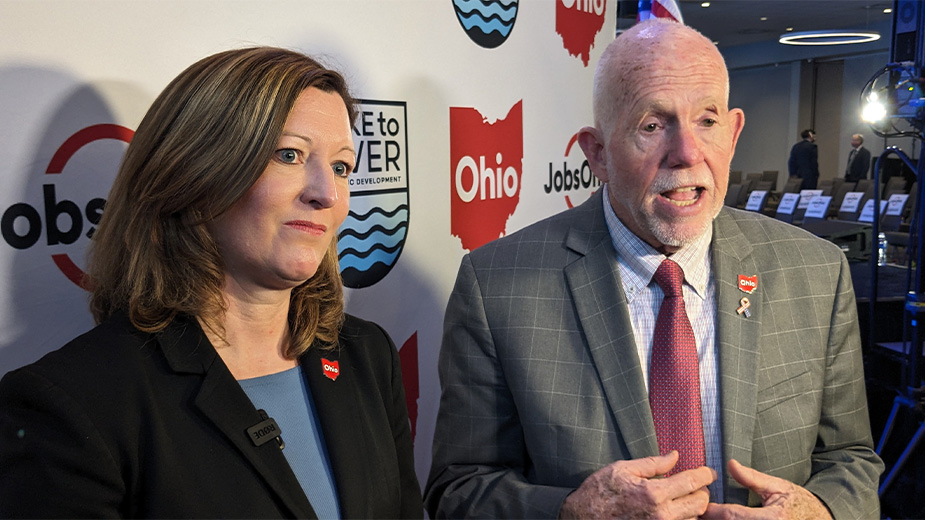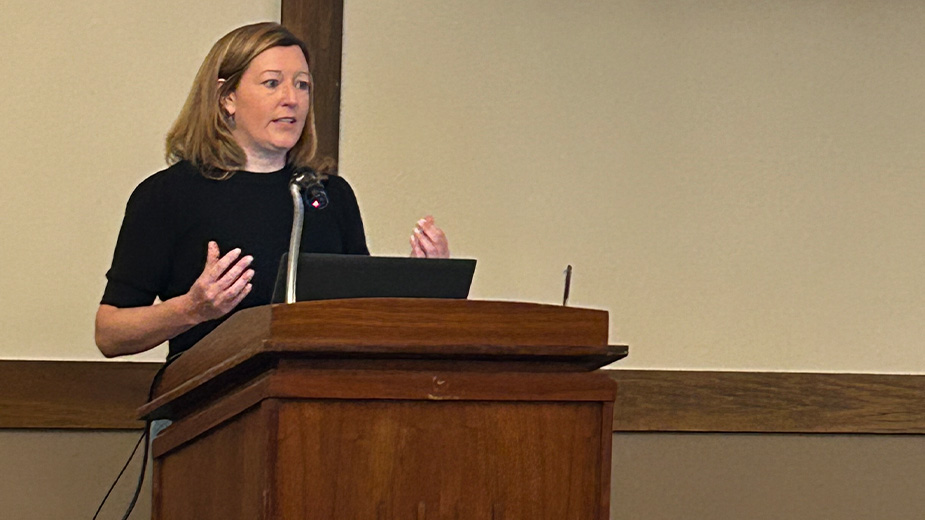Agencies Help Displaced GM Workers Find Jobs
YOUNGSTOWN, Ohio — Imagine the job you’ve worked for the last 20 years was suddenly taken away. Where do you go? What do you do?
For some 1,500 workers at the General Motors Lordstown Complex, those questions may not be easy ones to answer. However, training and workforce development agencies in the region are working to help get them and other displaced workers back on track.
Staff from OhioMeansJobs have been assisting workers from GM Lordstown since the second and third shifts were cut, which affected some 2,300 employees. The agency’s Trumbull branch staffs workers in the Transitional Center at United Auto Workers Local 1112 union hall Monday through Friday from 8 a.m. to 4 p.m. to help those displaced from layoffs find the education they need for their next career path.
Cheryl Jonesco worked at GM Lordstown since 2008 until she was laid off from the third shift, and again after being brought back on to work the second shift. After the first layoff, she started researching nursing programs in the area until she was brought back on for the second shift. However, she won’t pursue another career path this time around, she says.
“My plan is to transfer out of state to another GM plant,” she says. Jonesco is waiting to hear back from plants in Spring Hill, Tenn., and Arlington, Texas.
For now, she’s helping her former coworkers and others represented by UAW 1112 find their next step. Jonesco sees about 10 people daily at the transitional center, most of whom were laid off when the second and third shifts were cut, she says. But since GM announced in November it would halt production at the Lordstown Complex, she has been seeing more foot traffic from current employees.
“They come in to check out what’s available and what the program is all about,” she says.
Feedback from those workers is mixed, she says. Some believe Lordstown will get a new product while others aren’t so sure. And while some are trying to get transferred to another GM plant, most want education to find a new career locally, she says.
“People are fed up and frustrated,” she says. “They don’t want to pick up their families and leave the area they’ve lived in their whole life. I think some people have just had enough.”
After a mass layoff, displaced workers are eligible for tuition assistance through the U.S. Department of Labor’s Trade Adjustment Assistance, or TAA, program, as well as Trade Readjustment Allowances, says Kim Barrell, program administrator at the OhioMeansJobs Trumbull branch. Before workers can apply for TAA, they must be notified of mass layoff 60 days prior according to the Worker Adjustment and Retraining Notification Act of 1988. She expects the WARN notice to be issued later this month or early January.
When the notice is issued, Barrell advises workers to allow for 30 to 45 days from the time of application for TAA benefits to when they’re in a classroom. Until then, she recommends workers stop in to see what jobs are in demand in the area, update their resume and ensure they are in compliance with laws to receive unemployment benefits. They should also prepare for a job fair the agency set for May 2019, she says.
“We’ll definitely be working hard to make sure there are lots of employers there to help people who could potentially be looking,” Barrell says.
Dora Zandarski, adult division supervisor at Trumbull County Technical College, cautions workers that TAA can be used only once and they have a limited time to use it, she says. Zandarski’s husband used it to go back to school for truck driving.
“It’s a nice thing for people who are going to lose their jobs,” she says. “Right now, with machining and welding, you won’t be out of work for long.”
TCTC started receiving calls from current workers the week of the announcement at Lordstown. She says it’s a good idea for displaced workers in any industry to contact local schools to figure out what they want to do.
Welding and machining jobs “are plentiful in the area,” she says, and TCTC offers full-time programs in both, as well as automotive service, building trades, computer programming and medical assistant. The school also offers State Tested Nursing Assistant, or STNA, training.
Students will have to take a test to determine their grade-point average, which can be intimidating for some, says Marykay Papas, financial secretary at TCTC.
“They’re used to doing the job that they’ve been doing,” Papas says. “If you’re 50 and been working a job for a number of years, you haven’t thought about fractions in a really long time.”
Many of the available jobs in the area require a certain level of competency in math and science, and TCTC gets students up to speed, she says. Students can also earn a GED through the school’s AspireGED program.
When the layoffs at GM Lordstown take effect, Papas expects a large influx of people. When Delphi announced layoffs in 2008, she recalls enrollment increasing 60%, “if not more,” she says.
“We were packed to the gills,” she says. “We had waiting lists.”
When GM Lordstown cut its third shift, TCTC enrolled about 23 people. “That’s a lot for us. That’s about a third of our enrollment,” she says.
Arthur Daly, vice president of Eastern Gateway Community College Youngstown campus, says that the recent announcement by GM to halt production in Lordstown will result in a “much larger plot” of workers than the previous two shifts. Workers from Magna Seating in Warren and Jamestown Industries Inc. and Comprehensive Logistics Inc. in Youngstown will also need to find work.
“We want to make sure we’re available to them as well,” Daly says. “These folks got hit with some very hard news very quickly. I think it’s going to take a little bit of time for them to process.”
EGCC executives are reaching out to leadership at all companies affected to offer assistance, he says. In October, many of those second- and third-shift Lordstown workers visited EGCC campus for presentations, and eight have met with advisers and financial aid representatives to get the process moving, he says.
To acclimate the workers who haven’t stepped foot into a classroom in years, EGCC is putting together a comprehensive plan that includes additional tutoring when needed, computer training and smaller class sizes, he says.
“I think there are some frightened individuals who are not used to technology and have to retool their brains to think a different way when they come back into an educational environment,” he says. “We try to eliminate as many barriers as possible.”
In January, EGCC will launch a new commercial driver’s license program to meet the increased need for truck drivers, Daly says. The college is in the process of completing a deal with the Western Reserve Port Authority to do the hands-on driving portion of the training at the Youngstown-Warren Regional Airport.
“We’re partnering with the port authority to allow the trucks to be at the front part of the airport,” Daly says. “That’s going to be a high-demand field for sustainability and long-term employment opportunities.
The Bureau of Labor Statistics reports the job outlook for heavy and tractor-trailer truck drivers will increase 6% from now till 2026. In Ohio, Projections Central expects a 4% increase in those jobs. This year, Career Cast ranked “truck driver” as one of the 10 Toughest Jobs to Fill.
EGCC looks to open its new Health Workforce building next fall to offer training in nursing, medical assistants and other new programs. “Workforce is the buzzword,” he says, and EGCC plans to roll out more programs in 2019 to get people the skill sets they need to be put to work immediately.
“They don’t want to come back and sit for two to four years in a classroom,” he says. “If they can get a machining or welding certificate, or go into a program and be career-ready in a year, those are some of the things that we see on the horizon that we’re working toward.”
Mahoning County Career and Technical Center, Canfield, entered into a shared-service agreement with Choffin Career and Technical Center in Youngstown for the 2017-18 school year, allowing the entities to better serve displaced workers, says Jodi Glass, recruiter and marketing specialist at MCCTC.
“If we can’t service them here with what they’re looking for, then I can refer them to Choffin,” Glass says.
After the first of the year, welding and culinary arts classes will start up at MCCTC, with medical assistant, auto technology and medical office specialist classes beginning in the fall, Choffin looks to begin practical nursing, surgical technician and dental assistant classes, she says.
Classes through MCCTC and Choffin earn students industry credentials that employers are looking for, she says. An advisory committee composed of industry professionals advises the schools on curriculum and class offerings, she says, and an accrediting body makes them “100% accountable” for job placement. The school works to place students by giving them opportunities to interview with employers for the jobs they need.
“We try to stay current with what the workforce needs to fill,” Glass says. “I get calls from employers every week and I need to send them students to be able to interview for these openings.”
Pictured: Cheryl Jonesco helps displaced workers from UAW Local 1112 take the first steps toward a new career path in the union hall’s Transitional Center.
Copyright 2024 The Business Journal, Youngstown, Ohio.



